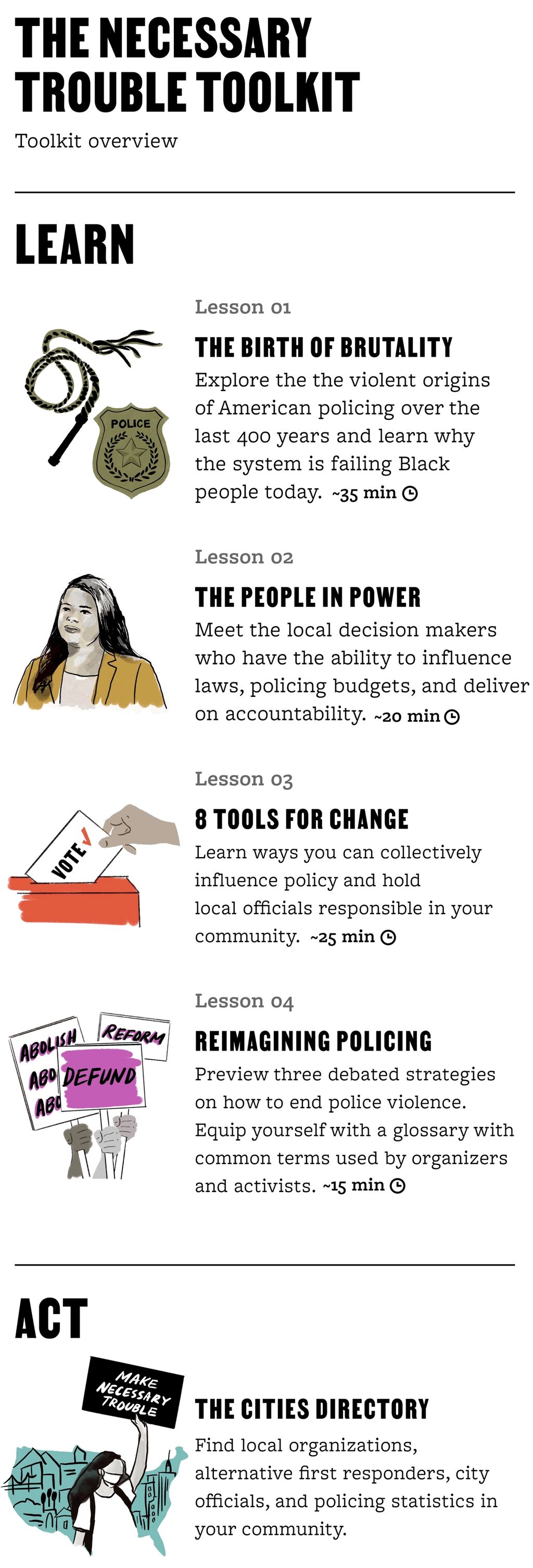Why We Made this
Collective and sustained local action makes lasting change possible in our communities.
A complex justice system
Information on how to end systemic police brutality is decentralized and difficult to decode. That’s because America’s justice system is intentionally complex and was built on a foundation of racial inequity, capitalism, and violence.
No group feels the impact of this more acutely than Black Americans who are 3.2x more likely than white people to be killed by the police.
It can feel exhausting, infuriating, traumatic, and overwhelming to fight inequity when you’re also the target. Conversations with family members and friends have made it clear that Black people who have the energy and desire to self-advocate need streamlined resources. Sustained engagement from non-Black allies is critical and necessary to change the status quo.
A few days after George Floyd was killed, we put together a volunteer coalition of Black and non-Black creatives, engineers, learning experts, community organizers, and policy managers. Our goal was to find a way design and technology could simplify the advocacy process for both groups to maintain the momentum reignited by the senseless loss of Breonna Taylor and so many others.
We then surveyed 300 non-Black American residents who agree police brutality against Black people is a problem. In these interviews and conversations, they shared why they hadn’t joined the Black community in the fight against it. Responses ranged from shame to being confused about which experts to trust and not knowing what specific steps to take to create change.
One learning hub
After interviewing organizers in the field to understand some of their challenges, our team of writers, policy managers, researchers, designers, and learning experts came together to create this toolkit, directly in response to the feedback.
Our big discovery? The most impactful way you can address this crisis as an individual is at the local level—we have the power to end brutality in our own communities.
Our toolkit was designed to onboard new advocates with the information they need to either confidently jump into their local organizing community or directly engage in small ways on their own. Our toolkit will:
- Explain the historical conditions that created today’s crisis
- Introduce you to key local decision makers and explain how to hold them accountable
- Provide actionable insights to help influence policy and create change
- Connect you with organizers and activists that can provide strategic guidance on how to make a difference in your community
You can explore it as a single, linear journey or drop into specific articles that meet you where you are today. Here's a brief overview of the Necessary Trouble toolkit:

Escalated collective action
We need to go beyond protest to break the cycle of police brutality.
History has shown us collective action creates impactful change exponentially faster. Organizers and activists have been pushing progress for centuries. Due to the current level of scrutiny on the staggering number of police killings, we are in a critical window of time where the power of your voice and vote is amplified.
We know this work can feel overwhelming at times. That’s why our Learn curriculum is a place for you to get credible information and start (or continue) your journey. But you can also go straight to local organizers and activists in Act who will help you become the advocate you want to be. Find your city.
Why? Because the Black community should have the right to breathe in America.
And together, we can make that happen.
—The Breathing Room Coalition